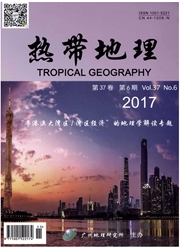

 中文摘要:
中文摘要:
基于SSCI数据库,对中国旅游学者发表的合作论文进行文献计量分析和社会网络分析,以揭示中国旅游学者在SSCI环境下科研合作的模式和特征,从而为中国旅游学者寻求科研合作提供参考。结果显示:中国旅游研究学者之间的合作不断加强,跨机构合作逐渐成为旅游学科领域合作的主要方式;由于“马太效应”在合作网络中普遍存在,学者合作呈现明显的幂律分布特征;合作的活跃程度在一定程度上与学术产出有关;合作网络明显呈现出“大分散、小集聚”的特征,部分核心学者拥有一群相互之间紧密联系但与其他学者相对隔离的合作者;中国的大陆、香港及台湾地区旅游学者的合作模式存在差异。最后,针对中国旅游学者的合作研究特征,提出促进中国旅游科学研究国际化发展的建议。
 英文摘要:
英文摘要:
With the rapid growth of knowledge, scientific cooperation increasingly becomes an important form of research work. The final results of scientific cooperation are often presented in the form of academic papers. Using bibliometric analysis and social network analysis, this paper reveals the mode and characteristics of Chinese tourism scholars’ cooperation based on SSCI papers, which provides a reference for Chinese tourism scholars to seek scientific cooperators. The results and conclusions are as follows. Firstly, from the perspective of cooperation trend, the number of SSCI papers published by Chinese scholars is growing fast, and the cooperation among Chinese tourism scholars have constantly strengthened. Cross-institutional collaboration has become main way of cooperation. Secondly, in terms of cooperative features, the collaborative group of central authors constantly expands because ‘Matthew effect’ is found in the network. As a result, the cooperation of scholars has an obvious characteristic of power law distribution. In addition, the active degree of cooperation is related to the academic output to a certain extent, which reflected in the scholars and institutions. For example, active scholars with high centrality like Law Rob, Song Haiyan and Bob Mckercher have a strong scientific and technological productivity. The Hong Kong Polytechnic University has cooperators all over the world, and that explains why it achieves high ranking in the tourism academic circle. Besides, the cooperative network has the characteristic of wide distribution and dense centralization, some of the scholars have a group of partners that are closely connected within the group but relatively isolated from other groups, and that would be detrimental to the spread of tourism academic knowledge. Although the cooperation between the central scholars is more extensive, their cohesion force is not strong, especially the China-Taiwan region has become an ‘academic isolated island’. Its academic cooperation with other region is
 同期刊论文项目
同期刊论文项目
 同项目期刊论文
同项目期刊论文
 期刊信息
期刊信息
